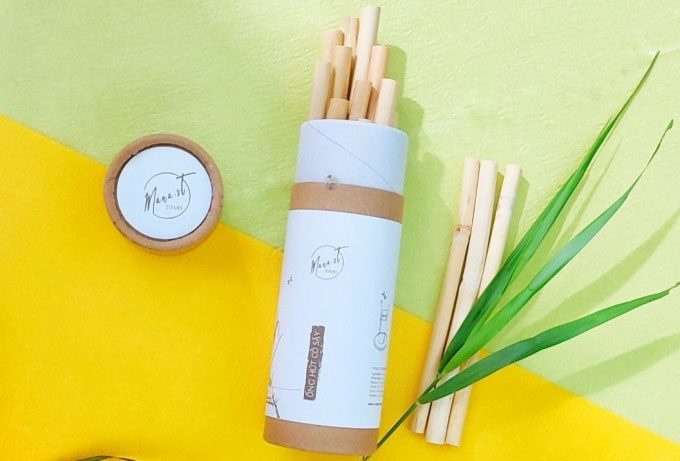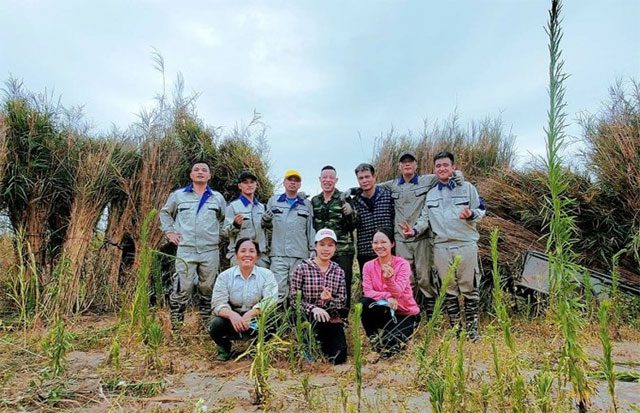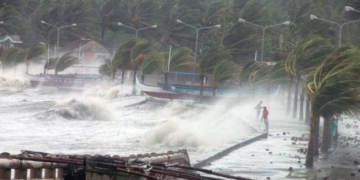From Wild Reed Grass, Đinh Thúy Phương and Her Research Team Develop Export-Quality Drinking Straws Using Advanced Technology.
Born in Quốc Oai District, on the outskirts of Hanoi, Phương witnessed the abandoned reed fields that negatively impacted local crops, forcing residents to cut, dry, and burn them. In 2011, after earning her Master’s degree in Management from the University of Northampton in the UK, Phương decided to return to Vietnam to start her own business. She was inspired to transform waste materials into economic value, similar to some recycling models in England.
Sharing her idea with three close friends, Hoàng Xuân Đức, Hoàng Thị Nga, and Hoàng Thị Thu Huyền, Phương sought their expertise. In 2020, the group of four young innovators focused on developing technology to enhance the value of reeds by turning them into drinking straws, replacing plastic alternatives.

Reed grass straws produced by the team. (Photo: NVCC)
The team assessed that reeds in Northern Vietnam are not tall, the straws are not straight, the diameter is small, and there are many nodes on the stems, leading to inconsistency. To enhance quality, the team employed hybridization techniques to create superior strains that address these shortcomings. After several rounds of crossbreeding, they successfully developed a strain of reed that yields more straws, with larger sizes, longer internodes, and greater uniformity. “Successfully hybridizing the reed strain allows us to produce straws in various sizes and lengths to meet customer demands,” Phương shared.
To increase the durability of the straws, the team developed a coating technology using modified cellulose containing active substances dispersed in a matrix, with a coating thickness of less than 1mm. This coating is formed in a viscous or gel-like state that adheres to the inner surface of the straw. Thanks to this coating, the straws have a longer shelf life, resistant to mold and microbial activity, and can be stored for up to two years. Additionally, they can be used with both hot and cold beverages without compromising straw quality. The reed grass straws have been certified by the Quality Measurement Standards Technical Center I as free from metal content, ensuring food safety according to Ministry of Health regulations.
Currently, the group has established a technological process from planting, machine processing, to packaging the final product. A cultivation model covering over 6 hectares has been implemented in Quốc Oai District, Hanoi, capable of producing more than 3 million straws per month. This model has created seasonal jobs for thousands of people, with wages ranging from 3 to 3.5 million VND per month.

Reed grass straws provide employment for many local people. (Photo: NVCC)
The straws are being sold on domestic e-commerce platforms, generating revenue exceeding hundreds of millions VND. According to Phương, a coffee chain with 70 outlets in Hanoi has placed regular orders. Several partners from the UK, Germany, and the USA have also contacted them for orders. “In the domestic market, we will sell at prices comparable to plastic straws to stimulate demand.” Currently, reed straws come in four sizes, with wholesale prices starting from 500 VND depending on the type.
Master Trần Chí Thành, a biotechnology expert and project advisor, evaluated that the reed grass straws help address several social issues, such as reducing plastic waste, increasing the economic value of reeds, and creating job opportunities for workers.
He noted that while there are many natural straw products on the market, the team has researched and bred a superior reed strain to produce straws of more consistent quality. “The team needs to evaluate customer experiences across various beverages to refine the product and compete in the market,” Thành stated.


















































